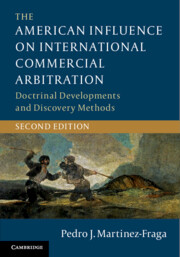 The American Influence on International Commercial Arbitration
The American Influence on International Commercial Arbitration Book contents
- The American Influence on International Commercial Arbitration
- The American Influence on International Commercial Arbitration
- Copyright page
- Dedication
- Epigraph
- Contents
- Foreword
- Preface
- Acknowledgments
- Table of Cases
- Table of Statutes and Rules
- Other Authorities
- Introduction
- 1 The Formation and Transformation of the Status of International and Domestic Arbitration in the United States
- 2 Wilko v. Swan, Scherk v. Alberto-Culver, and Mitsubishi v. Soler: Crafting a Level Playing Field
- 3 Arbitrator Immunity
- 4 Procedural Change and 28 U.S.C. § 1782: The Taking of Evidence v. Common Law Discovery
- 5 The New Unorthodox Conception of Common Law Transparency in International Arbitration Through Evidence Gathering and Orality
- 6 28 U.S.C. § 1782 and Manifest Disregard of the Law: Is Avoiding One Walking into the Other?
- 7 Perjury & Arbitration: The Honor System Where the Arbitrators Have the Honor and the Parties Have the System
- 8 Developments in the Apportionment of Jurisdiction Between Arbitrators and Courts Concerning the Validity of a Contract Containing an Arbitration Clause, and Transformations: Regarding the Severability Doctrine
- 9 U.S. Arbitration Law and Its Dialogue with the New York Convention: The Development of Four Issues
- Conclusion
- Book part
- Index
4 - Procedural Change and 28 U.S.C. § 1782: The Taking of Evidence v. Common Law Discovery
Published online by Cambridge University Press: 18 June 2020
- The American Influence on International Commercial Arbitration
- The American Influence on International Commercial Arbitration
- Copyright page
- Dedication
- Epigraph
- Contents
- Foreword
- Preface
- Acknowledgments
- Table of Cases
- Table of Statutes and Rules
- Other Authorities
- Introduction
- 1 The Formation and Transformation of the Status of International and Domestic Arbitration in the United States
- 2 Wilko v. Swan, Scherk v. Alberto-Culver, and Mitsubishi v. Soler: Crafting a Level Playing Field
- 3 Arbitrator Immunity
- 4 Procedural Change and 28 U.S.C. § 1782: The Taking of Evidence v. Common Law Discovery
- 5 The New Unorthodox Conception of Common Law Transparency in International Arbitration Through Evidence Gathering and Orality
- 6 28 U.S.C. § 1782 and Manifest Disregard of the Law: Is Avoiding One Walking into the Other?
- 7 Perjury & Arbitration: The Honor System Where the Arbitrators Have the Honor and the Parties Have the System
- 8 Developments in the Apportionment of Jurisdiction Between Arbitrators and Courts Concerning the Validity of a Contract Containing an Arbitration Clause, and Transformations: Regarding the Severability Doctrine
- 9 U.S. Arbitration Law and Its Dialogue with the New York Convention: The Development of Four Issues
- Conclusion
- Book part
- Index
Summary
The fourth chapter discusses the role of 28 U.S.C. §1782 in international commercial arbitration. Specifically, “the taking” or “gathering of evidence” is compared and contrasted to common law discovery. Emphasis is placed on the construction of a new paradigm asserting that when submitted to reasoned examination, the taking or the gathering of evidence has failed to generate sufficient timely transparency to contribute to creating appropriate settlement conditions. It is suggested that American common law discovery is configured and organized by many of the very fundamental tenets that international commercial arbitration seeks to preserve and to promote; most notably, party-autonomy and transparency. It also is suggested that arbitral procedural law in the context of “evidence gathering” has undergone a revolutionary transformation such that it shall require continental law practitioners to appreciate narrow and limited fundamental principles of U.S. common law discovery. Chapter four also focuses on the role of party-autonomy in the gathering of evidence, as well as the taking of discovery in international commercial arbitration.
Keywords
- Type
- Chapter
- Information
- The American Influence on International Commercial ArbitrationDoctrinal Developments and Discovery Methods, pp. 141 - 177Publisher: Cambridge University PressPrint publication year: 2020


